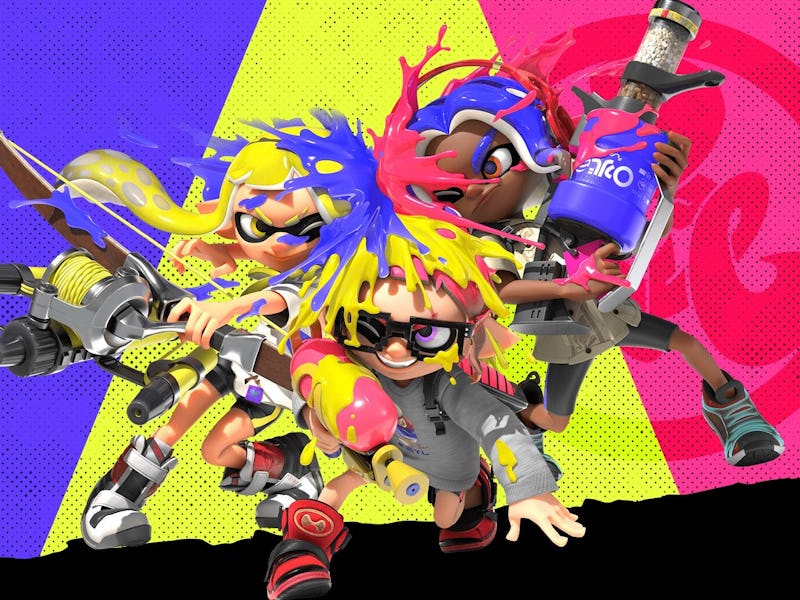Nintendo’s Response to Online Bigotry Shows An Industry Unsure How to Keep Players Safe
Nintendo makes a strong but halting step toward cleaning up the competitive scene.

Nintendo says it’s rescinding the title of the Splatoon 3 World Championship winning team three months after the event, following the discovery that the team had broken its community guidelines while playing. While Nintendo hasn’t specified exactly what behavior led to the move, members of the team in question, Team Jackpot, were caught sharing racist slurs on Discord, X, and while playing Splatoon 3. Nintendo’s response shows that the kid-friendly developer is willing to take the steps necessary to keep inexcusable behavior off its platform, but that there’s still a lot of room for improvement in how developers and publishers handle these cases.
Back in June, a thread on social media collected multiple examples of Team Jackpot’s members sharing racial slurs and racist memes across multiple channels. Some of the incidents collected include members of Team Jackpot directly using slurs to refer to other competitive Splatoon 3 players. Nintendo didn’t directly address the messages, and it’s not entirely clear when the company became aware of the team’s behavior. However, on July 23, it released a statement on social media announcing the decision to vacate the team’s win after its members “acted in a manner that is not in line with our Community Guidelines while playing the Splatoon 3 game.”
The move from Nintendo is more than a symbolic gesture. The members of Team Jackpot won’t receive trophies from the tournament, and Nintendo is even removing an in-game cosmetic banner celebrating the team’s champion status. One week before Nintendo’s announcement, the volunteer-run Splatoon Competitive Community Safety council issued a ban for all four of Team Jackpot’s members. While the group is not officially affiliated with Nintendo, the move means that the team’s members will no longer be able to participate in community-run Splatoon 3 tournaments for the duration of their bans, which range from two months to one year.
Nintendo’s willingness to take action against people who act against an important community safeguard is heartening to see. Online gaming is rife with toxic behavior, from cheating and bullying to an endless stream of bigotry directed at anyone from a marginalized group. All too often, developers and publishers are slow to respond or ignore the problem entirely. There seems to be an outspoken fear that taking action against toxic players will drive down the popularity of some online games — a mindset that really ought to have their creators considering how to clean up their communities before anything else.
Valorant creator Riot Games is another developer that recently stood up against abuse in its community.
The message from Nintendo comes nearly two months after Valorant creator Riot Games announced a new approach to handling toxicity following a high-profile case of misogynistic harassment against a streamer. In addition to releasing a video with a strongly worded condemnation of toxic behavior, Valorant vice president Anna Donlon outlined changes to its policies that include harsher penalties for hate speech and threats, a larger team to review harassment reports, and a wave of new penalties including hardware bans (which prevent a console or PC from ever accessing a game even with a new account) for particularly heinous behavior. While it’s too early to call the move for stronger penalties an emerging trend, the public nature of both Riot and Nintendo’s announcements show that at least some are willing to take a stand against online abuse.
On the other hand, Nintendo’s response to Team Jackpot may not go far enough. It’s unclear if Nintendo is instituting any sort of ban or more substantial penalty behind the scenes, but if so, it hasn’t announced it. Instead, it was left up to the volunteer organizers of Splatoon 3’s competitive scene to enact a ban themselves.
Nintendo’s response may not be perfect, but it’s a solid step to protect Splatoon 3 players.
Stronger penalties against hate speech of the kind Team Jackpot could be engaged in across the board, especially in a game like Splatoon 3, which has a large number of young players. Nintendo’s announcement did get the sort of hateful responses you’d expect to anyone taking a stand against bigotry on social media, but despite that, replies were significantly weighted toward people celebrating the decision. Maybe I’m just being optimistic, but it seems that a large part of the Splatoon 3 audience is eager to see action taken to keep its community safe.
Any solution to the problem of online toxicity is bound to be imperfect, limited by how a company defines what behavior is out of bounds and what ability they have to enforce their policies. While Nintendo’s response could have been stronger, it’s still good to see the developer defending its community in some way, and the work of the Splatoon Competitive Community Safety group shows how fans can step in to fill in the gaps. There’s clearly still work to do, but seeing some of gaming’s most popular developers stand up to bigotry is a solid step toward a better gaming community.